Virus bacteriophage - Study guides, Revision notes & Summaries
Looking for the best study guides, study notes and summaries about Virus bacteriophage? On this page you'll find 450 study documents about Virus bacteriophage.
All 450 results
Sort by
 Popular
Popular
-
EXAM 1 BIOS 242- CHAMBERLAIN ALREADY PASSED
- Exam (elaborations) • 17 pages • 2023
- Available in package deal
-
- £8.17
- 1x sold
- + learn more
EXAM 1 BIOS 242- CHAMBERLAIN ALREADY PASSED DNA is replicated in the ___ nucleus RNA is replicated in the ___ cytoplasm what is the first step in viral replication? penetration/adhesion (attaches to membrane using spikes) what is the second step in viral replication? uncoating what is the third step in viral replication? replication what is the fourth step in viral replication? assembly what is the fifth step in viral replication? maturation what is the sixth step in viral replication? r...
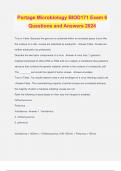 Popular
Popular
-
Portage Microbiology BIOD171 Exam 6 Questions and Answers 2024
- Exam (elaborations) • 7 pages • 2024 Popular
- Available in package deal
-
- £9.40
- 1x sold
- + learn more
Portage Microbiology BIOD171 Exam 6 Questions and Answers 2024 True or False. Because the genome is contained within an enclosed space (much like the nucleus of a cell), viruses are classified as eukaryotic. -Answer-False. Viruses are neither eukaryotic nor prokaryotic. Describe the two basic components of a virus. -Answer-A virus has (1) genomic material comprised of either DNA or RNA and (2) a capsid, a membrane-like protective structure that contains the genetic material, similar to th...
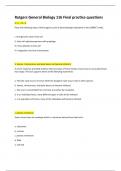
-
Rutgers General Biology 116 Final practice questions with Verified Answers
- Exam (elaborations) • 47 pages • 2023
-
- £9.81
- 1x sold
- + learn more
III > I > IV > II Place the following steps of the lysogenic cycle of bacteriophage replication in the CORRECT order. I. Viral genome enters host cell II. Host cell replicates genome with prophage III. Virus attaches to host cell IV. Integration into host chromosome b. Horses, rhinoceroses, and polar bears can become infected. A recent study has provided evidence that two types of horse herpes viruses have an unusually broad host range. This fact supports which of the following ...
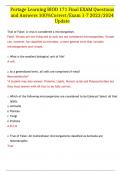
-
BIOD 171 Portage Learning Final EXAM Questions and Answers 100%Correct/Exam 1-7 2023/2024 Update
- Exam (elaborations) • 44 pages • 2023
-
- £17.18
- 5x sold
- + learn more
BIOD 171 Portage Learning Final EXAM Questions and Answers 100%Correct/Exam 1-7 2023/2024 UpdatePortage Learning BIOD 171 Final EXAM Questions and Answers 100%Correct/Exam 1-7 2023/2024 Update True or False: A virus is considered a microorganism. False. Viruses are not living and as such are not considered microorganisms. Viruses can, however, be classified as microbes, a more general term that includes microorganisms and viruses. 1. What is the smallest biological unit of life? A cell. ...
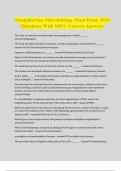
-
Straighterline Microbiology Final Exam 2024 Questions With 100% Correct Answers
- Exam (elaborations) • 21 pages • 2024
-
- £11.04
- 1x sold
- + learn more
Straighterline Microbiology Final Exam 2024 Questions With 100% Correct Answers The study of evolutionary relationships among organisms is called ______. - answerphylogeny The three cell types discussed, eukaryotes, archaea, and bacteria, all derived from ______. - answerLast Universal Common Ancestor Organisms called parasites are ______. - answeralways harmful to their host Which of the following does not indicate microbe involvement in energy and nutrient flow? - answerThermal hot spr...
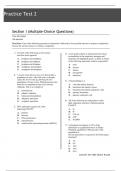
-
AP BIOLOGY EXAM PRACTICE
- Exam (elaborations) • 29 pages • 2023
-
- £8.17
- 1x sold
- + learn more
Section I (Multiple-Choice Questions) Time: 80 minutes 100 questions Directions: Each of the following questions or statements is followed by five possible answers or sentence completions. Choose the one best answer or sentence completion. 1. In which of the following are the nuclear activities most opposite? A. prophase and metaphase B. prophase and anaphase C. prophase and telophase D. metaphase and anaphase E. metaphase and telophase 2. A severe storm forms a new river that...
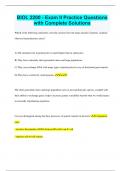
-
BIOL 2200 - Exam II Practice Questions with Complete Solutions
- Exam (elaborations) • 29 pages • 2024
- Available in package deal
-
- £8.17
- + learn more
BIOL 2200 - Exam II Practice Questions with Complete Solutions Which of the following statements correctly answers how the large amount of genetic variation observed in prokaryotes arises? A) The mutation rate in prokaryotes is much higher than in eukaryotes. B) They have extremely short generation times and large populations. C) They can exchange DNA with many types of prokaryotes by way of horizontal gene transfer. D) They have a relatively small genome. B and D The short gener...
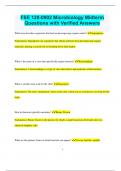
-
FSE 120-0902 Microbiology Midterm Questions with Verified Answers
- Exam (elaborations) • 38 pages • 2024
- Available in package deal
-
- £8.99
- + learn more
FSE 120-0902 Microbiology Midterm Questions with Verified Answers What term describes organisms that feed on decomposing organic matter? Saprophytes Explanation: Saprophytes are organisms that obtain nutrients from decomposing organic materials, playing a crucial role in breaking down dead matter. What is the name of a virus that specifically targets bacteria? Bacteriophage Explanation: A bacteriophage is a type of virus that infects and replicates within bacteria. What is another...
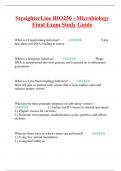
-
StraighterLine BIO250 - Microbiology Final Exam Study Guide
- Exam (elaborations) • 31 pages • 2024
- Available in package deal
-
- £9.40
- + learn more
StraighterLine BIO250 - Microbiology Final Exam Study Guide What is a Transforming Infection? - ANSWER Virus that alters cell DNA, leading to cancer What is a lysogenic infection? - ANSWER Phage DNA is incorporated into host genome and is passed on to subsequent generations What is a Lytic Bacteriophage Infection? - ANSWER Host cell gets so packed with viruses that is lyses (splits) open ...
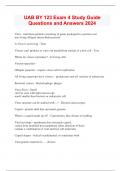
-
UAB BY 123 Exam 4 Study Guide Questions and Answers 2024
- Exam (elaborations) • 15 pages • 2024
-
- £11.86
- + learn more
Virus - infectious particle consisting of genes packaged in a protein coat non-living obligate intracellular parasite A Virus is not living - True Viruses can't produce or carry out metabolism outside of a host cell - True Where do viruses reproduce? - In living cells Viruses=parasites - Obligate parasites - require a host cell for replication All living organisms have viruses: - prokaryotes and all varieties of eukaryotes Bacterial viruses - Bacteriophage; phages Viru...

Study stress? For sellers on Stuvia, these are actually golden times. KA-CHING! Earn from your revision notes too and start uploading now. Discover all about earning on Stuvia


